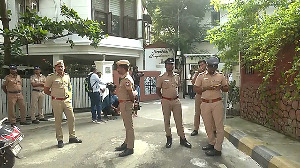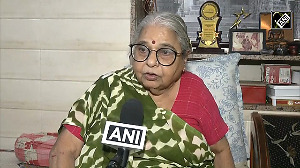It is incorrect to say that India was complacent and did not do adequate amount of work for containment of the second wave of the COVID-19 pandemic as no country was prepared for it, National Health Authority (NHA) CEO R S Sharma said on Thursday.

One cannot criticise or pass judgements that the country (India) was not prepared, Sharma said at India Global Forum 2021.
Responding to questions on whether India was too complacent about the second wave, he said India is a large and an extremely diverse country and when such a massive outbreak of a pandemic takes places, then suddenly a health system, which is not geared to cater even half of what came, in such a scenario every health system is going to be challenged by such impacts.
"We certainly need to put in more infrastructure, find new innovative ways to deliver health services in our country, especially to far-flung areas, but to say that India was complacent and did not do adequate amount work for containment is not correct," Sharma said.
"So, it is not an exception and one cannot criticise or pass judgements that the country was not prepared, because no country was prepared," he said.
India is an extremely large and diverse country so it is difficult to make general statements about the country, Sharma said.
Regarding the second wave, he said India was badly hit, but the country was alert and prompt in initiating immediate measures and was therefore able to contain it as quickly as it rose.
It was huge and came so suddenly, a very steep curve and the same speed at which it rose it also came down, Sharma said, adding that 'now we are in a much better position'.
The daily numbers have come down and the recovery rate is very high and as far as the vaccination is concerned over 350 million jabs have been administered, he said.
Asked if the worst is over for India when certain countries are preparing for another wave in the winter months, Sharma said, "I am not a scientist in that sense and cannot predict when the third wave will come and how serious or how bad it will be, but I can say that we have effectively managed the second wave and the numbers are down.
"Our healthcare workers and entire health system was under high pressure but it has sort of been successful in bringing down the numbers."
Responding to a question on the logistical challenges while planning and executing a vaccination strategy at such a scale to inoculate a huge population, Sharma said vaccinating one-sixth of about 1.35 billion population of India is not a trivial issue.
"Also, imagine the diversity of this country. We have to ensure that a person has been given two doses at an appropriate interval and to keep a track of that and keep a track of the vaccination in almost all areas from the logistics point of view is a herculean task," he said .
Also, the logistics of the vaccine delivery system, cold chain and taking it in remote areas is not a trivial issue, Sharma added.
"For that, we had to create a robust technology platform to take care of the entire program. Each vaccination event is recorded on the Co-WIN platform that we created and so far it has recorded 350 million vaccinations.
"It has helped us in planning the vaccination strategy, in figuring out which are underserved areas, helped us in managing the communication and ensuring that a person who has been given vaccine X is again given the same vaccine after appropriate interval," he said.
Responding to a question over failures and lack of preparations even in the most prepared healthcare systems around the world, what India has learnt, where there were failures, where the money, resources and time needs to be spent to make sure if this happens again India is better prepared, Sharma agreed we need to have better preparedness for such pandemics.
"You will agree with me that the scale of the pandemic is so high that even the best healthcare systems in the world have proven to be inadequate, India is no exception to that.
"However, I think we need to put in more efforts in improving our health infrastructure. We also need to leverage upon health services in a digital manner because in a pandemic time it is difficult to go to a hospital and you cannot come out of the house or you are in quarantine and there are restrictions so if you can use technology to consult doctors through tele-consultations and get medicines delivered at your places through digital platforms, that is the way," he said.
Sharma said that India is actually starting a massive program called national digital health mission, which will essentially ensure that many of the health services can be delivered in a digital manner which will be a very important health intervention.
Besides, the health infrastructure of the country has to be improved and Covid-appropriate behaviour has to be instilled in the population.
On vaccine hesitancy, he said it has been reduced to a very considerable extent after the second wave and people are coming forward.
Vaccine hesitancy is going away but India is a diverse country and there are areas where there could be some hesitancy, so these people need to be convinced and educated so that they get vaccinated.
Efforts are going on a massive scale and state governments are also launching campaigns to address the issue, he said.










